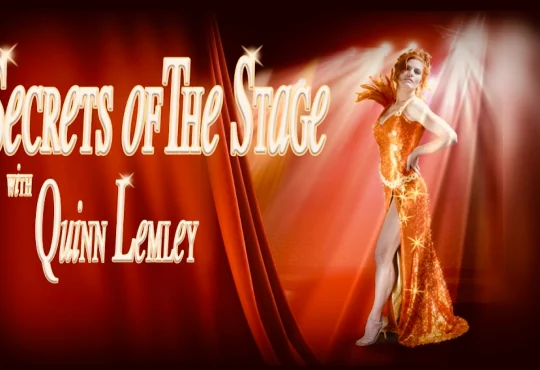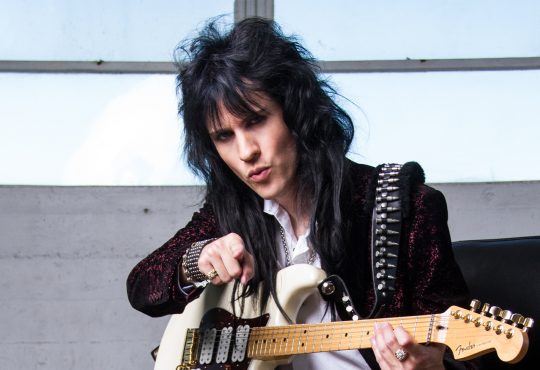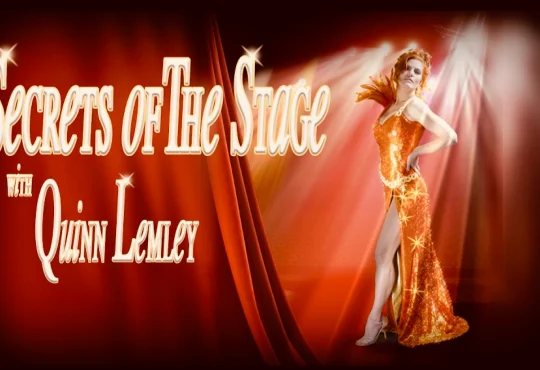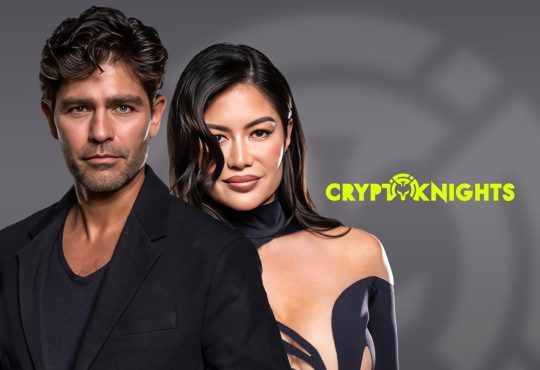The Last Word: LeVar Burton on the Upside of Losing the ‘Jeopardy!’ Gig and What ‘Star Trek’ Gave Him
Depending on your age, you either know LeVar Burton as Kunta Kinte on the groundbreaking Seventies series Roots, as the host of the classic Eighties educational TV show Reading Rainbow, or, of course, as Lt. Commander Geordi La Forge on Star Trek: The Next Generation.
So when fans approach him, can he tell where on that timeline they fall? “Ninety-five percent of the time,” the actor says. “More often than not, I am absolutely able to tell what’s their entry point to LeVar and the work I do. It’s cool. I am very proud of the way my career has been able to speak to different generations simultaneously. If it were easy, everybody would do it.”
In more recent years, Burton’s popular Twitter account led to a stint as a Jeopardy! guest host. He didn’t get the permanent gig, but he’ll be hosting an upcoming game-show version of Trivial Pursuit.
Here, Burton reflects on his Jeopardy! experience, the magic of Star Trek conventions, the lasting importance of Roots, and the advice he got from his friend Fred Rogers.
You’ve been a well-known actor for more than 40 years. Is there any downside to living so much of your life in the public eye?
Most recently I discovered that one of the downsides to fame is vulnerability. I put myself out there and publicly stated that I wanted the job on Jeopardy! — when I didn’t get the job, there was a lot of unnecessary concern that I was devastated, when in fact I wasn’t. I was disappointed, but I wasn’t devastated.
As a public personality, who you are is commented on and subject to the whims of people who don’t know you. In the age of social media, you have access to the good, the bad, and the ugly of what people think about you, [like] seeing on my Twitter, “Oh, he was terrible!” “He was the worst of all the guest hosts.” “He shit the bed!” Shit the bed? I don’t think I was that bad! You gotta have thick skin. As Forrest Gump would say, “That’s all I’m gonna say about that.”
Still, it is pretty amazing that grown-up Reading Rainbow fans came together to root for you to become the host. What was that like?
I felt the love. I can hardly speak about the experience. It was overwhelming, and it came from all quarters of the fandom. People who are casual fans reached out and said, “This makes so much sense. You were done dirty.” In the midst of all of that, one of the best things to come out of it was the love.
What did you learn from guest-hosting?
Alex Trebek was, in fact, a genius savant at that game. I really feel like given an opportunity, I would have mastered it, but it’s a lot harder than it looks. Out of the entire experience, I learned that everything does always work out for the best. The opportunities that I’m looking at right now would have never come to me had I gotten that gig.
Are you saying you believe things happen for a reason?
Always. Even when we can’t figure out what it is in the moment, in the fullness of time, the answer always reveals itself. In this case, it happened sooner rather than later. I didn’t have to wonder. It was demonstrated to me, the regard that I hold in people’s eyes. That’s worth so much more than a job, or money, or a car. It really is priceless to know that you have made a positive impact on lives.
Ken Jennings, Mike Richards, and Miyam Bialik all had controversies that surfaced when their names were floated for the job. Do you have any skeletons in your closet that could have gotten you booted off?
I would imagine that if I did, they would have come out at this point. One of my goals throughout this 45-year career has been to make my family proud. Or maybe, inversely, to not embarrass them. So far, so good.
Guest-hosting brought you a resurgence of fame that you haven’t had since you were 19. What advice would you give your younger self?
Oh, my goodness: Relax. It’s all going to work out. There was so much angst and anxiety that was a constant part of my life back then. When I look back on that kid, I marvel at his ability to be as present as he was. I also know that inside that calm, present exterior was a young soul who was really at times quaking, struggling to hold it all together [and] survive becoming famous in the late Seventies.
It was a pretty rock & roll time, let’s just say. It really was. Having access to everything that my heart desired, I survived the natural tendency of human beings to over-indulge in everything. I am really grateful that I had people around me that helped me survive that period of my life, and all of the uncertainty that went along with it.
I’ll say this: I wouldn’t want to be a young and emerging talent in today’s environment of the 24-hour news cycle and social media and a camera in everyone’s hand. I can’t imagine how much that adds to the burden of the journey. I’m just so glad that my rise to fame happened in the Neanderthal age.
“I wouldn’t want to be a young and emerging talent in today’s environment of the 24-hour news cycle and social media and a camera in everyone’s hand. I can’t imagine how much that adds to the burden of the journey.”
What would you say are the most important rules you live by?
Being rigorously honest with oneself is important, but being authentic is more important than that. Find out what your authentic self is and be that, come hell or high water.
You were really close with Fred Rogers. What advice did he give you that you keep with you to this day?
Oh, my goodness, Fred is a voice in my head. Fred was a Presbyterian minister, and I studied for the priesthood earlier in my life. We really met on the field of media as a tool for education. It was Fred who really encouraged me to use Reading Rainbow as a way to share who I was with the audience and create a bond, based on authenticity.
How do you think Roots would be different if it was made today?
We did retell the story about five years ago. It was an amazing and remarkable experience for me, being the person who was a part of both productions. I feel very strongly that that story should be kept alive in American culture and in American consciousness. It’s an essential part of who we are — the story of slavery in America. We should and need to keep that conversation alive. As we’ve seen, the tendency to [retreat] into an age of ignorance and denial is really strong. It’s really prevalent. We have to fight against the tendency to just lie to ourselves.
You’ve portrayed various aspects of Black life throughout your career — from slavery on Roots all the way to the future as Geordi La Forge.
How many people get to say that about their lives? I don’t take any of it for granted. I am grateful for everything in my life — the tragedy as well as the triumphs. That’s the stuff that life is made of. That’s the human condition. We have no resilience if there’s nothing to bounce back from, right?
You’ve confirmed that Geordi will not appear on Season Two of Picard, but do you ever see that happening in a later season?
I’m not psychic. Look, I love Star Trek. I love my castmates. Here’s what I will say about Picard: I do believe that whatever else is going on in his life, in the storytelling that they’re engaging in now, he still knows these people. It is certainly feasible, if not plausible, that they should show up at some point during this current adventure. We’ll see.
What’s the most special thing about attending Star Trek conventions?
You have to understand that [in my] family, we watched Star Trek religiously. If I wasn’t appearing at these conventions as part of the storytelling, I’d be on the other side as a fan in those rooms. Star Trek was really important to me growing up, because what Gene Roddenberry was saying to me was, “When the future comes, there’s a place for you.” That’s huge. Representation fucking matters. It does. Me being able to see myself in [original cast member] Nichelle Nichols was not simply inspiration, it was validation. That’s how powerful the medium can be.

“Whether they are aware of it or not, those white men who wrote the show had an unconscious bias that was on display to me and to other people of color,” Burton says of his ‘Next Generation’ role.
CBS/Getty Images
If The Next Generation was a current show, would you want anything to be different about Geordi?
Yeah. He’d get laid.
It’s pretty weird that Data, an android, got laid more than Geordi.
Weird? It’s insulting. Whether they are aware of it or not, those white men who wrote the show had an unconscious bias that was on display to me and to other people of color. Their blind spot is revealed in the fact that a Black man never was successful at one of the basic and most … My wife says, “There’s a lid for every pot.” It’s true. The idea that Geordi never found a lid for his pot is ludicrous. It’s preposterous, and it’s insulting.
Do you know the term “incel”?
Yes.
Some might describe Geordi as an incel.
I don’t think Geordi was an incel, because he wasn’t angry. I think that term comes along with the idea there’s some sort of maladaptation going on in the fixation. Geordi wasn’t angry, so I think it’s unfair to put him in that category.
Even so, he did some creepy things — like creating his dream woman in the Holodeck and trying to date his subordinate.
And that’s part of the problem, right? In their attempts to be cute, they inadvertently created an aspect of Geordi’s character that is very uncomfortable.
It’s crazy that warp speed is a thing, but Geordi needs a visor to see.
Well, I had that conversation with the powers that be. They always maintained that Geordi’s visor was a shorthand language of communicating the technological sophistication of the 24th century. I learned to be OK with that, until I wasn’t. We did seven years and one movie [1994’s Star Trek Generations]. After that, I was done. I was tired of having my eyes covered and was really insistent. We found a way, as I always knew we could, to shrink that technology into an ocular implant.
I was so excited about that. It took long enough.
It did. At the end of the day, it served its purpose. Geordi’s visor is iconic. You know exactly what you’re looking at when you see it. The idea that young people, male and female, put headbands over their eyes and play Geordi La Forge, is proof positive that it is an iconic image. Can’t argue with that.
What music still moves you the most?
Right now I’m stuck on the SiriusXM soul station because it’s the music I grew up with. It’s such a part of me, and it’s such a part of my life. Words have power in my universe. Soul music gets down to the root. It gets to the heart, to the center of things. Soul, that word, what it conjures up in me — I know a lot of it is the nostalgia factor that it holds, but it’s just damn good music.
Do you have a favorite soul track?
Oh, God, come on! How about anything that was released between 1971 and 1979?
What do you do to relax?
I used to read to relax. Now I’m constantly reading for work [laughs]. I really enjoy traveling and exposing myself to different places and different cultures. I haven’t been able to do that in a while, and I really miss it. There are few things more relaxing to me than being in a tropical environment on a beach. My skin glows when I’m in that Caribbean atmosphere. That’s when my soul gets replenished at a real elemental level.






